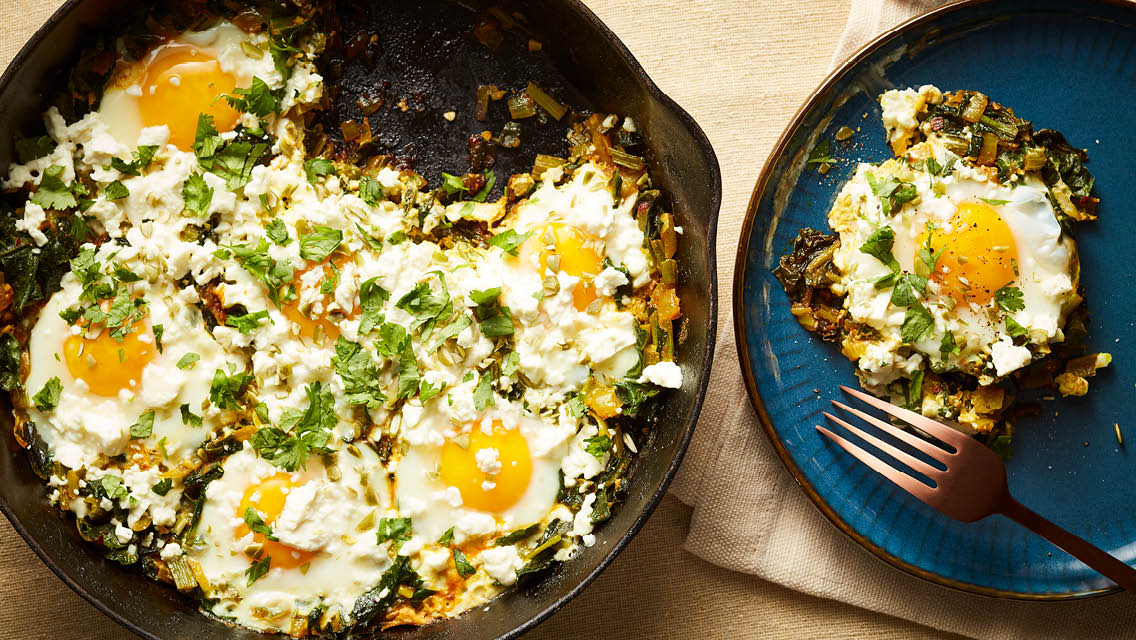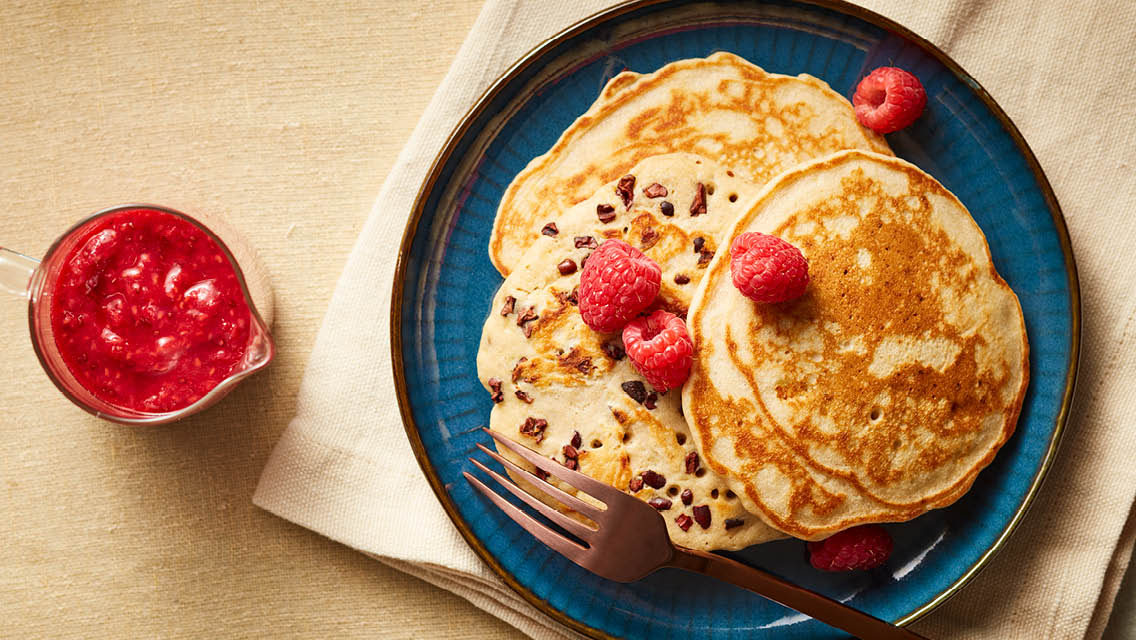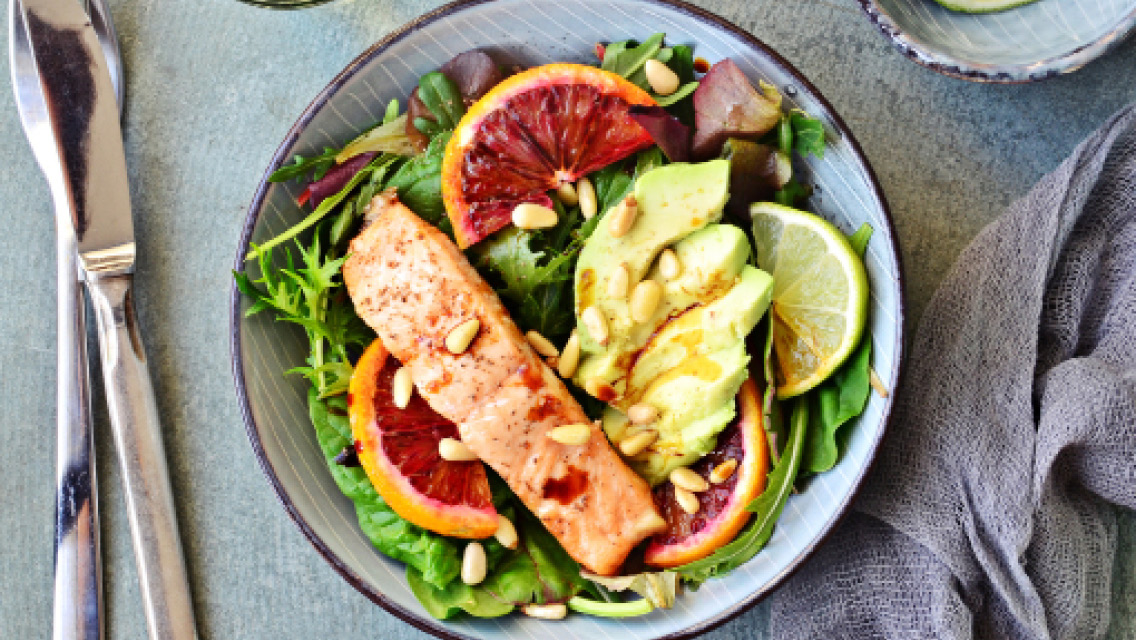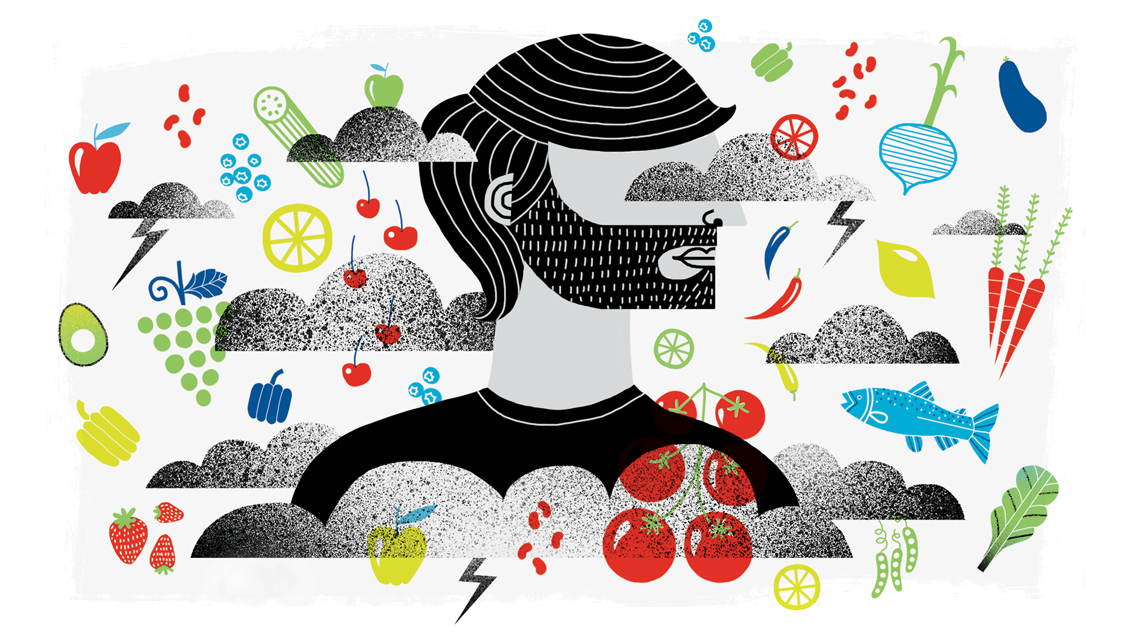Explore this article:
Maybe your mood is stubbornly low, or your anxiety is relentlessly high. Either way, you’ve got company. According to the National Institute of Mental Health, about one in five American adults will experience a mood disorder at some point in their lives. And many of us just feel … moody.
It’s easy to attribute these feelings to straightforward depression. Yet mood challenges can also be a signal that your body is calling out for better nutrition. “Your brain cells are your most metabolically active cells. This means they’re your hungriest cells, composed of the things that you eat,” says nutritional psychiatrist Drew Ramsey, MD, author of Eat to Beat Depression and Anxiety (for more about Ramsey and his research, see “Feed Your Mind” and listen to “Building Mental Health Through Nutrition.”)
Meanwhile, Ramsey notes, our brains are often undernourished. “The standard American diet is missing the nutrients that the brain needs to grow and function, in addition to causing inflammation and gut dysfunction and affecting how we feel.”
What’s more, the foods we use to soothe ourselves are often the same ones that spur negative mood states.
“High-sugar, high-fat, ultraprocessed ‘comfort foods’ that we seek out when we’re stressed or depressed tend to be the biggest triggers that disrupt mood,” explains integrative and functional nutritionist Cindi Lockhart, RDN, LD, IFNCP. “But we crave and eat them because they trigger an opioid-like reaction in the brain, making them addictive.”
Few of us grew up understanding how food affects our mood, and the mental health effects of food aren’t always immediate. “Often, people are surprised by the connection between food and mood,” says integrative psychiatrist Henry Emmons, MD. “It may take years of eating poorly before it really starts to affect their mental health.”
But there is good news: We can learn to eat in ways that truly comfort us (more on that in just a bit).
Bad-Mood Triggers
Building a solid nutritional foundation for mental health starts with recognizing how food may be contributing to low mood. These are some of the factors.
Blood Sugar
Some of us are more vulnerable to becoming hangry than others, but no one is immune. “If your blood sugar isn’t stable, it can mirror mental health issues like anxiety, depression, and fatigue,” says Lockhart. (For a deeper dive into blood sugar, listen to this Life Time Talks about “How to Balance Your Blood Sugar.“)
The brain runs primarily on glucose, and unstable blood sugar deprives the brain of that steady source of fuel. For example, when we haven’t eaten and our blood sugar dips, the brain doesn’t get the energy it needs to function well.
On the other hand, eating foods that cause blood sugar to peak and then drop quickly — think refined sugars and other simple carbohydrates — can lead to insulin resistance.
Insulin helps maintain our energy levels by shuttling glucose into our cells, explains Lockhart. When we consume a lot of sugar, there’s abundant glucose in the blood, and the cells are constantly exposed to insulin. Over time, this ongoing exposure makes them less sensitive to insulin’s signals — and this harms mood, among other things. “Depression is twice as likely if you have type 2 diabetes,” she notes.
Conversely, well-managed blood sugar can have notably positive effects on the brain. “Keeping your blood sugar stable affects almost every aspect of brain function and energy production and protects your brain as you age,” says Emmons. “It also helps reduce inflammation, which goes a long way toward preventing dementia, Alzheimer’s, and other forms of cognitive decline.”
Nutrient Deficiency
Too much sugar isn’t the only diet-related challenge to mental health. The brain requires specific nutrients, and it often doesn’t get them.
“For proper brain and mood function you need to have the right elements, like protein,” says integrative psychiatrist Hyla Cass, MD. “[Protein] contains amino acids that produce neurotransmitters that regulate mood.”
If we’re low in serotonin, Cass explains, we tend to be depressed. Likewise, insufficient gamma-aminobutyric acid (GABA) is linked with anxiety, and a lack of dopamine may affect focus.
These are some of the nutrients the brain needs most:
- Protein: In addition to providing amino acids to build neurotransmitters, protein supports mood by how it helps stabilize blood sugar — and most of us can feel it.
- B vitamins: These nutrients, which act as antioxidants, help transform food into glucose. Specifically, folate (B9) and B12 help produce neurotransmitters necessary for brain function, says Cass. Depression is a common symptom of folate deficiency. (Read “How B Vitamins Can Help Lift Depression” for more.)
- Omega-3 fatty acids: The brain is more than 60 percent fat. “Omega-3’s essential fatty acids support neuronal-tissue synthesis, membrane fluidity, and serotonin metabolism,” says Lockhart. “These mechanisms help to ease anxiety and depression.” (For ways to enhance your diet and health with omegas, see “Why Your Body Needs Omega-3 Fatty Acids.”)
Gut Dysbiosis
When our gut is disrupted, our mood often reflects it. That’s partly because the gut communicates with the brain directly through the gut–brain axis, a complex pathway linking the central nervous system and the gastrointestinal tract, where many neurotransmitters are forged. “Friendly bacteria in the microbiome are important for making serotonin, dopamine, and GABA,” says Cass.
This is why the gut is sometimes referred to as the second brain. Some estimates suggest that up to 90 percent of the body’s serotonin is produced by gut bacteria. Glutamate, which contributes to learning, memory, and cognition, is also produced in the gut. (For more on the connection between the gut and the brain, see “Healthy Gut, Healthy Brain.”)
This relationship goes both ways, notes Emmons. “Gut issues, like cramping, bloating, and constipation, are signals that you are stressed or out of balance,” he explains. “They mean that your gut and your brain need your attention.”
Food Allergies and Sensitivities
Food allergies and sensitivities can trigger inflammation in the gut. “When the gut is inflamed, so is your brain, putting you at risk for anxiety and depression,” says Emmons.
Gut inflammation can lead to a condition called leaky gut syndrome. When the delicate, single-cell barrier of the gut becomes damaged, it enables food particles to leak from the gut to the bloodstream; the immune system recognizes these particles as invaders and launches an attack.
This is how inflammation that starts in the gut spreads systemwide. Antigens crossing the blood–brain barrier can trigger inflammation in the brain. Neuroinflammation is associated with a range of mood and brain-health issues, including cognitive decline. (For more on leaky gut syndrome, see “What Is Leaky Gut?“)
8 Ways to Support Your Mood With Food
There are no instant solutions to mental health challenges, but a few relatively easy dietary interventions can help stabilize and improve your mood over time.
1. Eat More Plants
Many traditional foodways offer a helpful framework for upgrading your diet, and most give pride of place to vegetables and fruits — unlike the typical American diet.
Of all traditional diets, the Mediterranean may be the best studied. “The Mediterranean diet is a great mood-supportive way of eating and living,” Lockhart says. “It focuses on nutrient-balanced meals that include vegetables, fruits, nuts, and legumes; healthy fats, like extra-virgin olive oil; and wild-caught fish and whole grains.”
This approach provides the abundant fiber, protein, and healthy fats necessary to maintain a steady mood. “The Mediterranean diet contains nutrients for the brain that promote neuroplasticity; helps populate the microbiome with good bugs; and stabilizes blood sugar,” says Ramsey.
One study found that a third of clinically depressed participants following a Mediterranean diet for depression were in remission by the study’s conclusion.
2. Mind the Caffeine
For some, a daily cup of coffee or tea is an antidote to depression. For others, caffeine exacerbates anxiety and disrupts sleep. If a racing mind and restless nights are among your challenges, consider cutting back on or eliminating caffeine to see whether you notice improvements. (For more on detoxing from caffeine, see “How Much Caffeine Is Right for Me?“)
3. Focus on Healthy Fats
The omega-3 essential fatty acids found in coldwater fish like salmon, mackerel, anchovies, sardines, and herring are especially key for brain health. (You can remember this fish list with the acronym SMASH.)
“Make it your goal to eat two to three meals that feature SMASH fish each week,” Lockhart advises. “Omega-3 fats increase cell-membrane fluidity, neurotransmission, and neuroplasticity.” (Explore our guide to understanding omega-3 and omega-6 fatty acids and how they influence your health.)
4. Feed your Friendly Gut Flora
Fermented foods help support the beneficial flora in your gut, where so many neurotransmitters are produced. Try including something fermented each day. That could be plain yogurt, kefir, sauerkraut, kimchi, or fermented vegetables. (For more on probiotics and brain health, visit “Everything You Need to Know About Probiotics.”)
5. Increase Fiber
Fiber is key for both gut and brain health. Whole grains like quinoa, for example, can help keep blood sugar steady and increase the levels of serotonin in your brain, says herbalist Brigitte Mars, AHG, coauthor of Natural Remedies for Mental and Emotional Health.
Another way to support the gut microbiome is with more prebiotics. These are a type of fiber that feed good bacteria, and they’re found in onions, leeks, garlic, Jerusalem artichokes, asparagus, apples, and konjac — a high-fiber tuber commonly consumed as an ingredient in shirataki noodles.
Mars notes that these fiber-filled foods also offer other benefits. “Oatmeal, for example, has antioxidant and anti-inflammatory properties because it contains carotenoids, vitamin E, flavonoids, and polyphenols.” (For more on fiber, visit “Why You Need to Eat Fiber“; for more on prebiotics, visit “Why Prebiotics Are as Important as Probiotics.”)
6. Avoid Food-Sensitivity Triggers
Because food sensitivities and allergies can contribute to systemic inflammation, eliminating problem foods can often make a big difference in your overall mood, says Emmons.
“Finding out how differently you feel when you avoid foods that you react to is often an aha moment for many people.”
If you suspect you have food sensitivities but aren’t sure, Emmons recommends trying a modified elimination diet. This starts with eliminating common allergens, such as gluten, dairy, eggs, peanuts, soy, and corn, for several weeks.
During the reintroduction period, you’ll add foods back one at a time, which allows you to identify which ones — if any — cause a reaction. (For more on elimination protocols, visit “The Institute for Functional Medicine’s Elimination Diet Comprehensive Guide and Food Plan.”)
7. Consider Meal Timing
Maintaining a 12-hour fasting window between dinner and breakfast can help stabilize mood by balancing blood-sugar levels, Emmons notes. “Ayurvedic medicine suggests that you go about 12 hours between supper and breakfast each day,” he says. “This helps your gut to take a break from digestion, allows your blood sugar to even out, helps with insulin regulation, and reduces inflammation.”
For some people, eating four to six smaller meals daily, rather than three big ones, is also useful for supporting mood.
“Eating whole foods more frequently helps you avoid a drop in blood sugar and the anxiety and depression that can result,” says Mars. “It’s important not to get too hungry.”
Lockhart notes that consuming most of your calories earlier in the day can balance blood sugar. “Breakfast is key, as our insulin receptivity is greatest in the first half of the day,” she says. “So is our metabolism and digestion.”
A study published in Obesity found that when subjects ate half of their calories at breakfast, 36 percent at lunch, and 14 percent at dinner, it led to lower fasting blood sugar and better insulin levels. (For more on time-restricted eating and fasting, visit “Everything You Need to Know About Intermittent Fasting.”)
8. Listen to Your Body
While the brain and body do have baseline requirements, the best dietary protocol for your mood will be based on the needs and preferences of your unique body.
“The body and brain can thrive with the right ingredients, but one diet may not work for everyone,” says Emmons. “If you’re anxious, the best diet for you will be different than for someone who is depressed or sluggish.”
Finally, remember that good mental health involves being kind to yourself. That can mean saying yes to dessert from time to time.
“Occasional sweets are OK,” Emmons advises. “Just be sure and eat them in small amounts with protein and fat to avoid spiking glucose levels.”
12 Key Nutrients for Mood Support
According to nutritional psychiatrist Drew Ramsey, MD, these are the most important nutrients for supporting your mental health:
- Iron is essential for forming hemoglobin, the protein in red blood cells that helps transport oxygen from the lungs to the brain. Food sources: red meat, pumpkin seeds, oysters, and spinach.
- Magnesium regulates neurotransmitters that stabilize mood. Food sources: almonds, cashews, and spinach. (See “Why Magnesium Is Crucial for Your Health” for more.)
- Omega-3 fatty acids, such as long-chain EPA and DHA, promote neuroplasticity and neurotransmission. Food sources: wild salmon, anchovies, walnuts, and flaxseeds.
- Potassium is necessary for neurotransmission. Food sources: bananas, broccoli, sweet potatoes, and white beans.
- Selenium helps thyroid function and regulates mood. Food sources: Brazil nuts, sardines, and eggs.
- Vitamin A supports neuroplasticity. Food sources: leafy greens, orange and yellow vegetables, and beef liver.
- Vitamin B6 aids brain growth and function. Food sources: chickpeas, beef liver, and leafy greens.
- Vitamin B12 helps produce the neurotransmitters serotonin and dopamine. Food sources: clams, dairy products, and nutritional yeast.
- Folate, or B9, is critical for mood. Food sources: Brussels sprouts, leafy greens, and beef liver. (Learn more about B vitamins at “All About B Vitamins.”)
- Thiamine, or B1, supports energy production for brain health. Food sources: nuts, legumes, and beef.
- Vitamin C is a powerful antioxidant that fights inflammation. Food sources: citrus, red peppers, broccoli, leafy greens, and strawberries.
- Zinc can aid neuroplasticity. Food sources: pumpkin seeds, oysters, and beef.
Mood-Friendly Meals
Green Shakshuka
This dish delivers ample B vitamins, which are key for a stable mood and a calm mind. Make this year-round with any leafy greens you love — collards in winter, Swiss chard and kale in the spring, and spinach in the summer. Or combine them to your liking. Serve it with crusty bread if you wish, though the pepitas provide plenty of texture and crunch without it.

Makes 4 servings • Prep time 15 minutes • Cook time 25 minutes
- 2 tbs. olive oil
- 2 large bunches Swiss chard (about 11/2 lb.), stems and leaves coarsely chopped and kept separate (about 9 packed cups total)
- 1 medium yellow onion, diced
- 3 garlic cloves, minced
- 1 tsp. ground cumin
- ¾ tsp. kosher salt, plus a pinch
- ½ tsp. smoked paprika
- ¼ tsp. red-pepper flakes
- ¼ tsp. ground turmeric
- ⅓ cup vegetable broth
- 8 large eggs
- 3 oz. feta cheese, crumbled (about ¾ cup)
- 2 tbs. chopped fresh cilantro
- 2 tbs. chopped pepitas
- Warm the olive oil in a 12-inch skillet over medium-high heat. Add the Swiss chard stems and onion, and cook for four to five minutes, until tender.
- Add the garlic, cumin, ¾ teaspoon salt, paprika, red-pepper flakes, and turmeric. Cook, stirring, for one more minute or until fragrant. Stir in the Swiss chard leaves and vegetable broth, and cook for two to three minutes, until the leaves are tender and most of the broth has evaporated.
- Reduce the heat to medium-low. Using the back of a wooden spoon, create eight divots in the chard mixture. Crack an egg into each. Season the eggs with a pinch of salt. Cook until the whites are almost set, five to seven minutes. Sprinkle the cheese over the top, then cover and cook until the whites are set and the yolks are cooked to your liking, two to four minutes more.
- Serve in shallow bowls garnished with the cilantro and pepitas.
Buckwheat Cacao Pancakes With Raspberry Compote
Pancakes are comfort food, and this version is both energizing and mood boosting. With ample fiber and magnesium, these pancakes are great for mental health. Using cacao nibs brings all the benefits of chocolate and just a trace of sugar; instead, we’ve added banana for sweetness (and potassium). Buckwheat flour is gluten-free and has 10 times more magnesium than white flour.

Makes 12 pancakes
Compote
- ½ lb. fresh or frozen raspberries
- 1 tbs. lemon juice
- 1 tbs. maple syrup
- ¼ tsp. pure vanilla extract
- 2 tsp. chia seeds
Pancakes
- 1 ripe banana
- 1 cup whole milk (or non-dairy milk)
- 1 tbs. fresh lemon juice
- 1 tbs. maple syrup, plus more for serving
- 1 tbs. avocado or coconut oil, plus more for cooking
- 1 large egg, whisked
- 1 tsp. pure vanilla extract
- 1 cup buckwheat flour
- 1 tsp. baking powder
- ½ tsp. kosher salt
- ½ cup cacao nibs
- To make the compote, add the raspberries, lemon juice, maple syrup, and vanilla extract to a small saucepan and bring mixture to a boil over medium-high heat. Stir often. Reduce heat to medium-low. Keep stirring and use a fork for whisk to mash the fruit. When it has reduced by about half and is quite thick, turn off the heat, stir in the chia seeds and set aside to cool.
- To make the pancakes, in a medium bowl, use a fork to mash the banana thoroughly. Stir in the milk and lemon juice and allow to sit for at least 10 minutes to create your own buttermilk. (Alternatively, you could replace the milk with buttermilk and skip the lemon juice.)
- Stir the maple syrup, avocado oil, egg, and vanilla into the banana mixture.
- In a separate large bowl, whisk together buckwheat flour, baking powder, and salt.
- Stir wet ingredients into dry until just mixed. (Too much stirring will make the pancakes tough.) Let the batter rest for five minutes.
- Warm a large skillet over medium heat. Add 1 tablespoon avocado oil and swirl to coat the pan. Use a ¼-cup measuring cup to add pancake batter to the skillet; sprinkle each pancake with cacao nibs. Flip when bubbles form and then pop on the pancakes; three to four minutes. Cook until the second side is golden brown, one to two minutes. Repeat until you’ve used all the batter.
- Top with compote and serve with maple syrup and butter as desired.
Learn More
Looking to enhance the mental health of a loved one — or yourself?
We’ve curated a range of articles to help you support your mental health needs here.





This Post Has One Comment
Fantastic article!